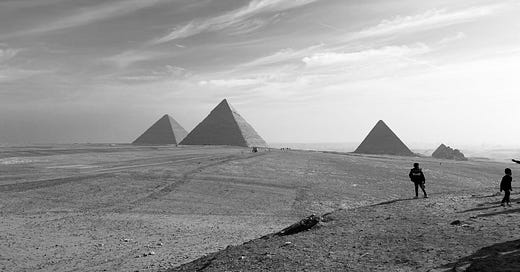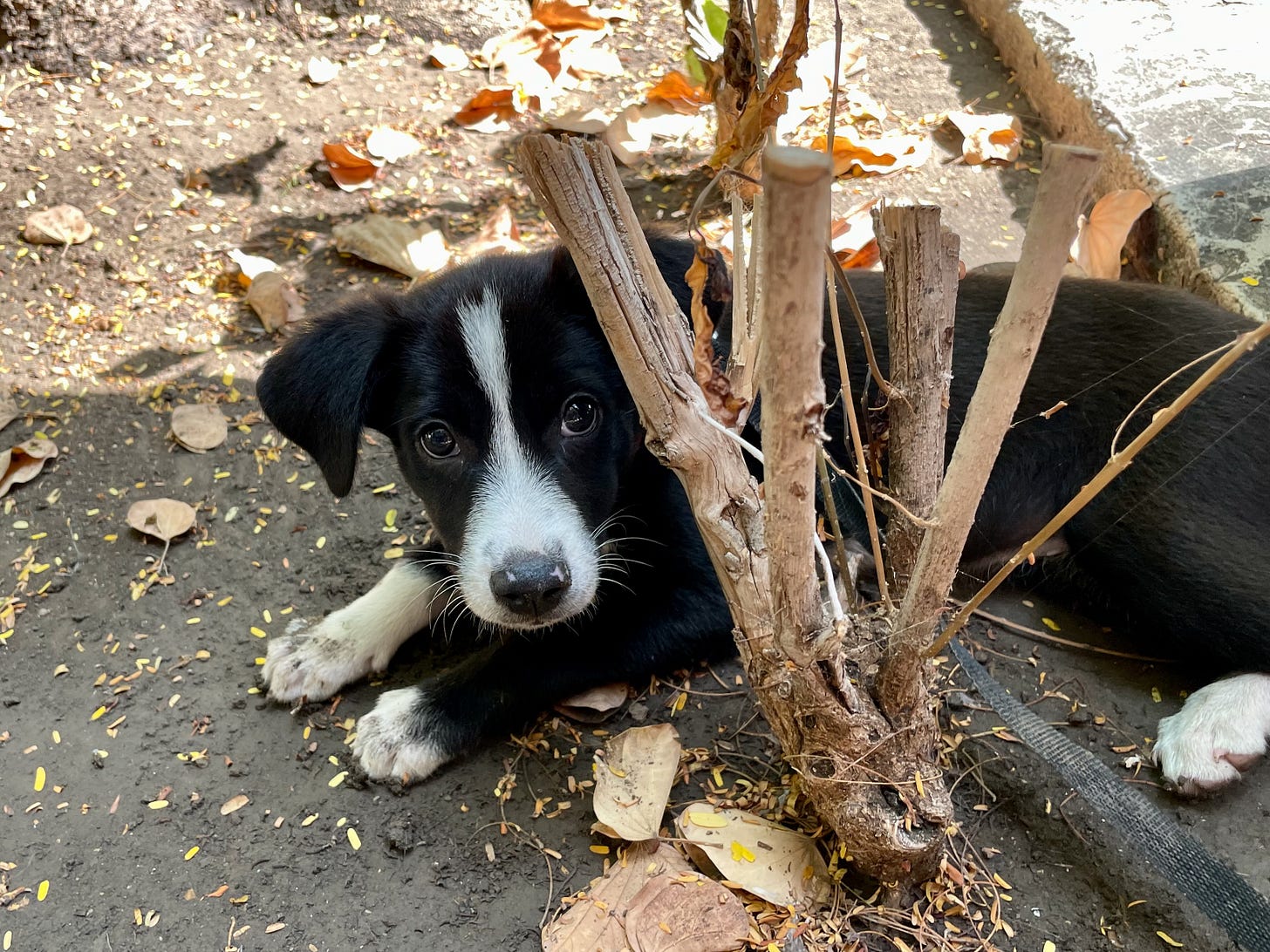Goodbye to All That: On Loving and Leaving Cairo
not the best note to go out on, but here we are
Friends, I recently got a puppy. I wasn’t looking for one, and the timing couldn’t have been worse—Nick’s diplomatic assignment ends in a few short weeks, at which time we’ll have to leave Cairo for good. She just showed up on the corner one day and I knew she was for me. I was parked in front of my housing compound on a hazy afternoon, waiting for the security guards to finish checking under the hood for car bombs, when I spotted her. She was sitting alone in a grassy patch that belonged to the big white villa across the street, and it was like the heavens parted, spotlighting her: a little cherub not more than two months old, with a black coat and white markings on her chest, head, and paws.
I was besotted. I stared at her, smiling like a fool, willing her to come to me with every brain wave I could muster. She must have gotten my message, because she met my eyes and ran right over. I couldn’t get out of the car fast enough. I crouched on the sidewalk to pet her—she was downy as a duckling—and she disappeared under the hem of my dress, wiggling through my legs in clumsy figure eights. I asked the plain clothes cop on the corner, where is her mother? He replied, no mother. I had seen homeless puppies before, but never without mothers. So I resolved to become her mother, and now I am raising an Egyptian street dog. She has such a sweet disposition that Nick named her Basbousa, after the semolina cake flavored with orange flower. We call her Boo for short.
While I am an introvert, Boo beelines at anything with a pulse, tail whipping ecstatically and leaking a trail of pee behind her. Consequently, I have had more conversations with Egyptians since adopting Boo than in the prior two years combined. Each time I take her out, she drags me over to the gardener, the handyman, the security guards. We exchange pleasantries while Boo flops around at their feet like a fish on dry land, showing the black and white spots on her belly. They all say some variation of, “does she get to go home to the States with you? Masha’allah, she is the luckiest dog in Egypt! Take me with you instead!” I genuinely thought they were joking at first.
“I never thought to have a dog, but she has changed my mind because she’s so sweet,” one man said the other day, as Boo whined and strained at her leash to reach a bowl of cat food set out for the strays. “She’ll go back to the States with you? I want to go to the States very badly.”
“You can get a visa someday, right?” I asked.
“Insha’allah. I have worked for the Embassy for ten years. I can apply for residency after another ten,” He said. I did some quick math—he would have started just as President Sisi came to power, not long after some 600 protestors met their untimely end in Rabaa Square. “I also put in my application for the green card lottery.”
“I’ll cross my fingers for you,” I said.
He smiled wistfully. “I think everything in the States is quality. It’s good there?”
“Americans like to work too much,” I said—a platitude offered because I didn’t want to sound prideful—“but yes, it’s a good life.”
Then he leaned in, casting his eyes from side to side. The police were just around the corner, and they were always listening. He kept his voice low as he asked, “and…the rights?”
“Yes, those are very important to us,” I said. “You will have them from the moment you arrive.”
My friend gave a nod. “The quality,” he sighed. “Once I bought two Snickers bars, and I couldn’t believe how good they were.”
I thought of how many Snickers bars I had scarfed without a second thought, how many countries I’d been allowed to enter with no questions asked, how many times I’d criticized my president with no reason to fear. I smiled, and focusing hard to keep my voice from breaking, I replied, “those are my favorite, too.”
***
We had one week with Boo before Hamas and Israel went to war. A few days later, Nick and I stood in the spit of dirt that passes for our compound’s dog run, urging Boo to do her business. The air had finally changed after Cairo’s long summer. The wind had blown hot as a hairdryer and kept us inside our U.S. government-furnished, air-conditioned apartment as the rest of the city suffered rolling blackouts. Now the breeze had cooled enough to emerge from hibernation. We had plans to meet a friend, Amr, for dinner at the Marriott in Zamalek, but word of a demonstration just across the river had made me uneasy.
“Are you sure we should drive downtown tonight?” I asked Nick. Boo was busy digging sand out from under the fence, ignoring our entreaties of please, please go potty.
“I don’t think there’s reason to worry.” It was a peaceful march that started after Friday prayers, Nick said—Cairenes were merely answering President Sisi’s call for demonstrations in support of the beseiged Gaza Strip, and and anyway, we should make an effort to see Amr before we packed up our apartment and left the city for good.
I said ok, I trust your judgment. But events in Cairo have a way of surprising you, and I had barely finished my sentence when a warning from a coworker flashed on Nick’s iPhone. Protestors had overwhelmed police in Tahrir Square, which had not been on the government’s list of officially sanctioned demonstration locations. The crowd was chanting a slogan that had nothing to do with Gaza: bread, freedom, and social justice.
The last time those words were uttered in Tahrir, the people had been attempted revolution. The drive to the Marriott would have taken us straight into the fray, so Nick texted Amr our apologies and we ushered Boo inside.
In the days that followed, the familiar call of bekya, which echoes off the limestone facades of my neighborhood each afternoon, was drowned out by sirens and the buffeting sound of helicopters. For too long Egypt had dangled from a ledge, its fingers sweaty and white with strain, and it was as though its grip had finally loosened. Cold, hard ground was rushing up to meet us.
***
I had to make a work trip back to Washington last week. I was loathe to leave Boo for the first time, and when my friends asked “how are things in Cairo?” in a dim, wood-paneled bar, I showed them pictures of my new fur baby: Boo cradling her stuffed duck, Boo curled up on the carpet like a donut. They cooed politely, but the worry in their eyes said I hadn’t really answered the question. They had watched the evening news as half of Palestine massed at the Rafah border crossing. They had heard the Egyptian pound was no longer worth the paper it was printed on, and they had seen missiles hit South Sinai. They looked at me like it was 1979 and I was about to board a plane to Tehran. “Are you sure you have to go back there?” they asked.
I told them yes. I have duties to my husband, my dog, and my country, in that order, and soon enough my little family of three will take our diplomatic passports and move somewhere gentler, a place with natural sunlight and a grassy backyard for Boo. Going back doesn’t scare me. What scares me is a feeling in my bones that even if the flame trees still bloom each spring and the thick, sweet smell of flavored tobacco still wafts from the ahwas, Cairo may cease to exist as I’ve known and loved it, and I will never be able to return.
What scares me even more is what might become of friends and neighbors who cannot leave, who envy my dog for her adopted citizenship—the cashier at the corner store who knows hibiscus juice is my favorite and whose eyes shine when he tells me what he’s reading, the barista who still gives me my coffee when I forget to bring cash and says seeing me happy is enough for him, my tennis instructor who tells me, constantly, “don’t be tension!”
Reader, if you worry for anyone, if you pray for anyone, let it be for them. Pray they will one day have a fighting chance and a goddamn Snickers bar whenever they feel like it.
The other day, I had to tell my friend, the lover of Snickers, that my time in Cairo was nearly up. It was difficult not to feel ashamed at how easy leaving was for me, but what could I do?
“You are leaving so soon!” He said. “I will miss you, and I will miss little Basbousa.”
“You will see her again in the States one day, insha’allah,” I answered.
I hope that is true. I hope wherever he goes next—wherever his country goes next—that God goes with him.






It is heartbreaking to hear of people without the freedom to say what they wish or to go where they want. My prayers are not limited, so I will pray for your safety and theirs. I will pray that all people have freedom and the right to choose how and where they live and or worship.
You captured a feeling I had ever sing year when I would return back to the states from my summers in Egypt. You learn a lot about the privilege we have here. The world is filled with good caring people and it’s hard to reconcile the different hands we are dealt.